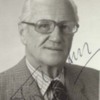
Aljean Harmetz
Author of The Making of the Wizard of Oz: Movie Magic and Studio Power in the Prime of MGM
About the Author
Aljean Harmetz is the author of The Making of The Wizard of Oz, as well as numerous other film-related books. A former journalist for the New York Times, she lives in Los Angeles
Works by Aljean Harmetz
The Making of the Wizard of Oz: Movie Magic and Studio Power in the Prime of MGM (1977) 291 copies, 3 reviews
Round Up the Usual Suspects: The Making of "Casablanca" - Bogart, Bergman, and World War II (1992) 268 copies, 6 reviews
Tagged
Common Knowledge
- Other names
- Levin, Aljean Meltsir
- Birthdate
- 1929-12-30
- Gender
- female
- Nationality
- USA
Members
Reviews
Lists
Awards
You May Also Like
Associated Authors
Statistics
- Works
- 7
- Members
- 689
- Popularity
- #36,713
- Rating
- 4.1
- Reviews
- 10
- ISBNs
- 22
- Languages
- 1












